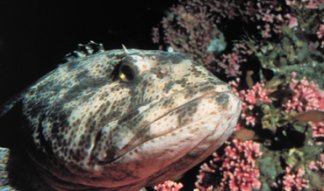Fishing for fun takes toll
Sportfishing can account for a surprisingly large part of the catch of certain types of saltwater fish.
By Emily Sohn
Fishing is a popular pastime—maybe too popular when people go after certain saltwater fish.
Chartering a boat or taking your own vessel out to sea to go fishing for fun is a large industry. Yet, for a long time, people thought that all the fish caught in this way represent just a tiny fraction of the number of fish caught by commercial fishing boats and sold in markets or brought to factories.
 |
|
Once targeted by both recreational anglers and commercial fishing boats, the lingcod is one of many saltwater species being overfished.
|
| OAR, NURP, Alaska Dept. Fish and Game |
The impact of sportfishing is much bigger than previously suspected, say researchers from Florida State University in Tallahassee.
When the researchers took a close look at U.S. fisheries data, collected over more than 22 years, they found that recreational fishing accounts for 4 percent of fish caught. Two types of fish, menhaden and pollack, make up the bulk of the commercial catch, however. When these two types of fish are left out of the analysis, the fraction of all other fish caught and killed in recreational fishing jumps to 10 percent.
Finally, the researchers looked just at species that have been classified as “overfished.” That’s where the numbers are more troubling. Recreational anglers account for 59 percent of red snapper landings in the Gulf of Mexico, for example, and 93 percent of red drum landings in the southern U.S. Atlantic.
In some places and for some types of fish, it might be time for stricter regulations, the researchers say. There are already limits on the number of fish that someone can catch in many locations. But regulators rarely limit the number of people allowed to go fishing.
People aren’t going to stop fishing. If they just threw back what they caught, though, the fish now at risk might be better off.
Going Deeper:
Milius, Susan. 2004. There’s a catch: Recreation takes toll on marine fish. Science News 166(Aug. 28):133-134. Available at http://www.sciencenews.org/articles/20040828/fob6.asp .
You can learn more about U.S. marine recreational fisheries at www.st.nmfs.gov/st1/recreational/index.html (National Oceanic and Atmospheric Administration).







